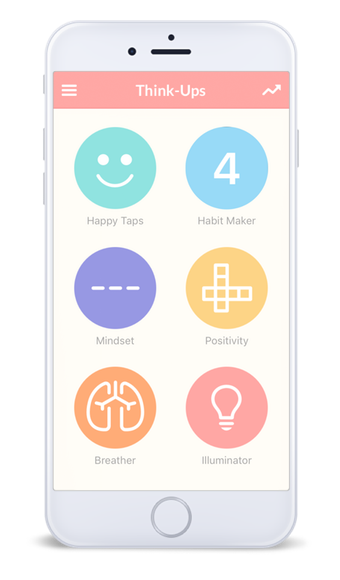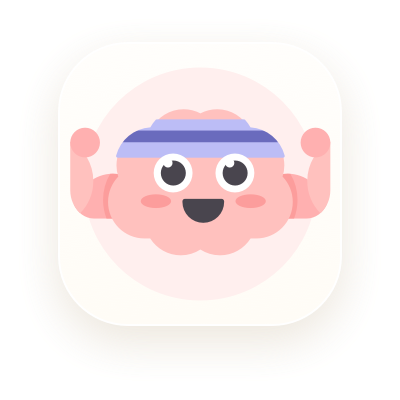How it works
Think-Ups combines a range of scientific techniques* to give your brain an all-round mental workout. For best results, do your Think-Ups every morning and every evening, and anytime in between if you need a quick boost.
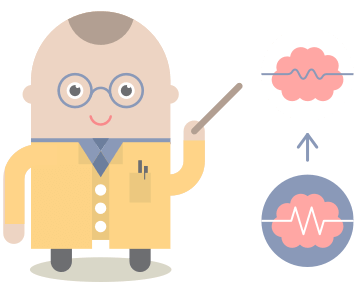
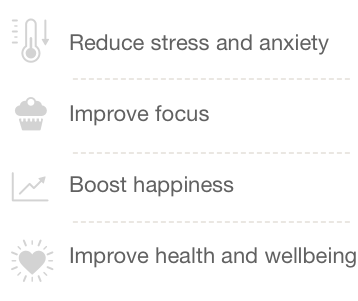
*Mindfulness, Cognitive Behavioural Therapy, Bias Modification, Positive Psychology, Nutritional Therapy and Psychoeducation
Screenshots

HAPPY TAPS
Happy Taps uses cognitive bias modification to train your brain to focus more on positive information. Upload your own happy images to practice gratitude and boost happiness.1
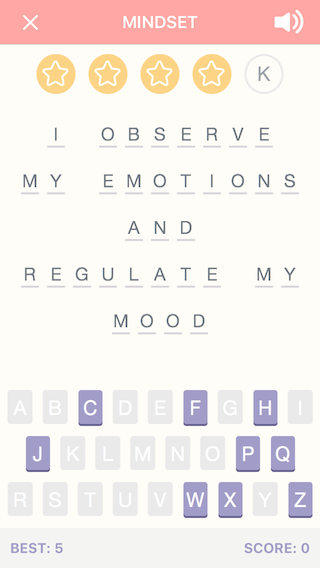
MINDSET
Mindset is an affirmation word game that strengthens self-esteem and willpower, while reinforcing the patterns of thinking associated with optimal mental health and wellbeing.2
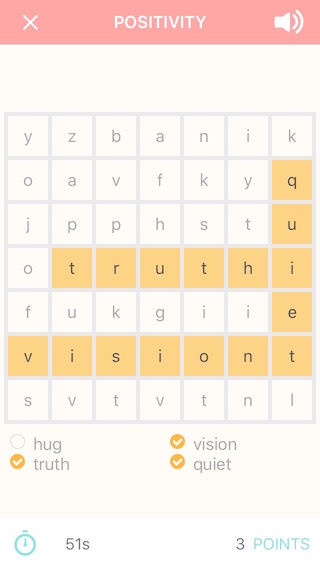
POSITIVITY
Positivity is a word search game that uses only positive words. Focusing on positive words has been shown to help increase resilience to stress, lower anxiety, and boost your mood.3
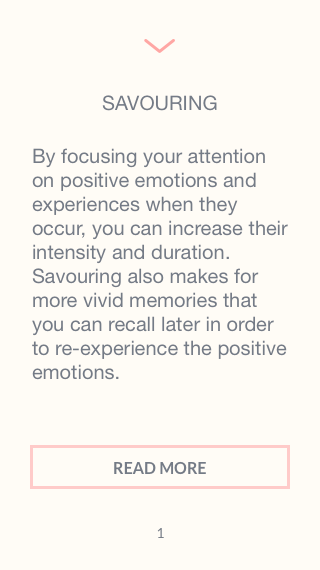
ILLUMINATOR
The Illuminator is a collection of bite-sized facts, tips and techniques that you can use to get the most out of your brilliant brain.4

BREATHER
The Breather is a mindful breathing exercise helps to lower stress and anxiety and strengthen focus.5
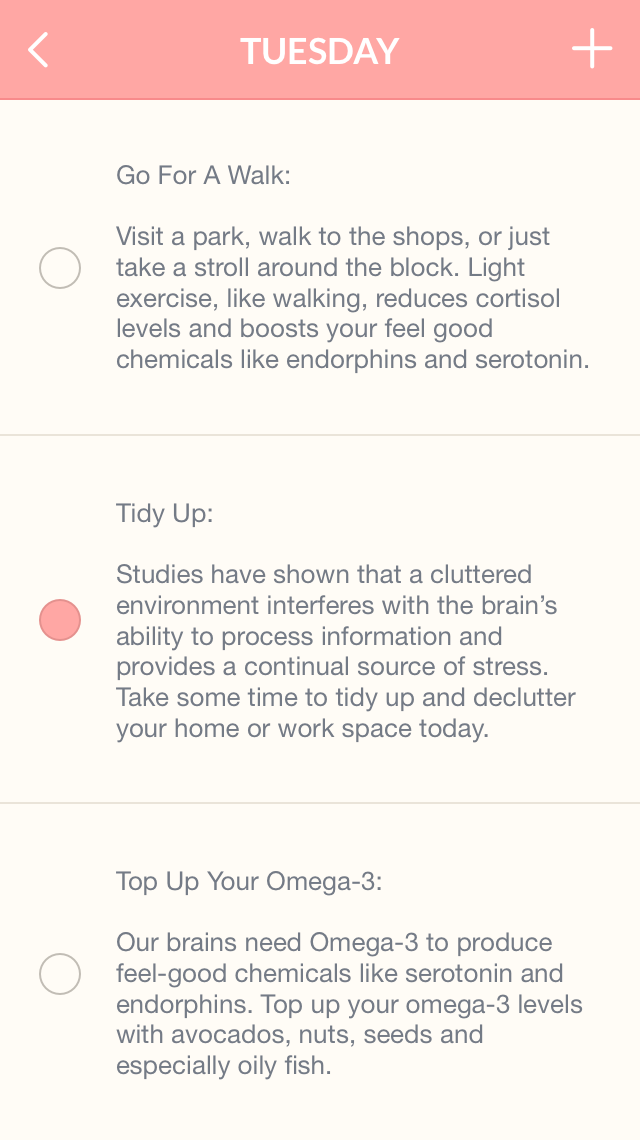
HABIT MAKER
The Habit Maker helps you to track and develop habits for optimal mental health, wellbieng and happiness.
The Science
1) HAPPY TAPS
.1) CBM lowers stress and anxiety levels
Norman B. Schmidt, J. Anthony Richey, Julia D. Buckner, Kiara R. Timpano (2009)” Attention Training for Generalized Social Anxiety Disorder”,Journal of Abnormal Psychology - J ABNORMAL PSYCHOL, vol. 118, no. 1, pp. 5-14
.2) Cognitive Bias Modification can be effective in the treatment of Generalised Anxiety Disorder
Amir, N., Beard, C., Burns, M., and Bomyea, J. “Attention modification program in individuals with generalized anxiety disorder”. J Abnorm Psychol. 2009; 118: 28–33
.3) CBM can help to treat Depression
Holmes, E. A., Lang, T. J., & Shah, D. M. (2009). Developing interpretation bias modification as a "cognitive vaccine" for depressed mood: imagining positive events makes you feel better than thinking about them verbally. J Abnorm Psychol, 118(1)
.4) CBM helps you to focus more on positive information
Michael Browning, Emily A. Holmes, Susannah E. Murphy, Guy M. Goodwin, and Catherine J. Harmer (May 15, 2010) “Lateral Prefrontal Cortex Mediates the Cognitive Modification of Attentional Bias” Biol Psychiatry. 67(10): 919–925.
.5) CBM helps to disengage from negative information
Heeren, A., Lievens, L., & Philippot, P. (2011). How does attention training work in social phobia: Disengagement from threat or reengagement to non-threat? Journal of Anxiety Disorders, 25, 1108-1115.
.6) CBM causes changes in the brain associated with positive, happier thinking
Michael Browning, Emily A. Holmes, Susannah E. Murphy, Guy M. Goodwin, and Catherine J. Harmer (May 15, 2010) “Lateral Prefrontal Cortex Mediates the Cognitive Modification of Attentional Bias” Biol Psychiatry. 67(10): 919–925.
.7) Attentional Cognitive Bias Modification can reduce anxiety associated with public speaking
Amir, N., Weber, G., Beard, C., Bomyea, J., & Taylor, C. T. (2008). “The effects of a single-session attention modification program on response to a public-speaking challenge in socially anxious individuals.” Journal of Abnormal Psychology, 117, 860-868.
2) MINDSET
.1) Self-affirmations to strengthen sense of self
Schmeichel, Brandon J.; Vohs, Kathleen (2009). Self-affirmation and self-control: Affirming core values counteracts ego depletion. Journal of Personality and Social Psychology. Vol 96(4), 770-782.
.2) Self-affirmations can help to reduce stress
Cohen, G. L., & Sherman, D. K. (2014). The psychology of change: Self-affirmation and social
psychological intervention. Annual review of psychology, 65, 333-371
.3) Self-affirmations to boost your mood
Sherman, D. K., & Cohen, G. L. (2006). The psychology of self-defense: Self-affirmation theory. In M. P. Zanna (Ed.) Advances in experimental social psychology, 38, pp. 183-242. New York, NY: Guildford Press.
.4) Self-affirmations to strengthen self-esteem
Koole, S. L., Smeets, K., Van Knippenberg, A., & Dijksterhuis, A. (1999). The cessation of rumination through self-affirmation. Journal of Personality and Social Psychology, 77(1), 111
.5) Increase self-control with affirmations
Fein, S., & Spencer, S. J. (1997). Prejudice as self-image maintenance: Affirming the self through derogating others. Journal of Personality and Social Psychology, 73(1), 31
3) POSITIVITY
.1) Focusing on positive words can reduce Anxiety and Depression
Generalized hypervigilance in fibromyalgia patients: an experimental analysis with the emotional Stroop paradigm. González JL, Mercado F, Barjola P, Carretero I, López-López A, Bullones MA, Fernández-Sánchez M, Alonso M. J Psychosom Res. 2010 Sep;69(3):279-87.
.2) Positive Words Trigger Motivational Centers in the Brain
What is in a word? No versus Yes differentially engage the lateral orbitofrontal cortex. Alia-Klein N, Goldstein RZ, Tomasi D, Zhang L, Fagin-Jones S, Telang F, Wang GJ, Fowler JS, Volkow ND. Emotion. 2007 Aug;7(3):649-59.
.3) Positive Words can Help Build Resilience
Happiness unpacked: positive emotions increase life satisfaction by building resilience. Cohn MA, Fredrickson BL, Brown SL, Mikels JA,Conway AM. Emotion. 2009 Jun;9(3):361-8.
.4) Positive Words can help lower physical and emotional stress
Genomic counter-stress changes induced by the relaxation response. Dusek JA, Otu HH, Wohlhueter AL, Bhasin M, Zerbini LF, Joseph MG, Benson H, Libermann TA. PLoS One. 2008 Jul 2;3(7):e2576.
.5) Positive Words Stimulate Frontal Lobe Activity
Newberg, Andrew B.; Waldman, Mark Robert (July 14, 2012). Words Can Change Your Brain: 12 Conversation Strategies to Build Trust, Resolve Conflict, and Increase Intimacy (hardcover). Hudson Street Press.
.6) Positive words improve cognitive reasoning and strengthen areas in the frontal lobes
Newberg, Andrew B.; Waldman, Mark Robert (July 14, 2012). Words Can Change Your Brain: 12 Conversation Strategies to Build Trust, Resolve Conflict, and Increase Intimacy (hardcover). Hudson Street Press.
5) ILLUMINATOR
The habits, tips and techniques prescribed in Illuminator are based a large number of different studies and theories in Psychology and Neuroscience. For a complete list of references, please contact us.
5) BREATHER
.1) Deep breathng helps reduce stress and anxiety
Kim, S.D., Kim, H.S. "Effects of a relaxation breathing exercise on anxiety, depression, and leukocyte in hemopoietic stem cell transplantation patients." Cancer Nurs. 2005;1:79.
Lee, P.S. "Theoretical bases and technical application of breathing therapy in stress management." J Korean Acad Nurs. 1999;6:1304–1313.
Tad T. Brunyé, Caroline R. Mahoney et al (2013). "Learning to relax: Evaluating four brief interventions for overcoming the negative emotions accompanying math anxiety". a Tufts University, Department of Psychology
.2) Deep breathng triggers Relaxation Response
Benson, H., Greenwood, M.M., Klemchuk, H. "The relaxation response: Psychophysiologic aspects and clinical applications." Int J Psychiatry Med. 1975;1:87–98.

